The Stomach Cancer Treatment Cost in South Korea approximately starts from KRW 20140350 (USD 15000)
Cancer is a disease where cells start to grow abnormally and form a tumor. When this condition develops in the stomach, it is known as Stomach Cancer.
It can be anywhere in the stomach, that may cause various symptoms and tend to have several outcomes. These cancers develop slowly and take several years to be able to identify.
There are many types of stomach cancer such as Adenocarcinoma, Lymphoma, Gastrointestinal stromal tumor (GIST), Carcinoid tumor and as mentioned earlier symptoms for each may vary.
Since it develops slowly, early-stage stomach cancer hardly shows any causes or symptoms. This makes it hard to detect early but one can keep an eye on a few of the points which could be a sign of stomach cancer such as:
The above symptoms could be the sign of Ulcer or some other issues but if anyone has these problems must go to the doctors for a complete check-up so that it can be treated.
Below are the major factors affecting the cost of Stomach Cancer treatment. Thus, the early detection of stomach cancer can reduce the economic burden.
| Country | Cost | Local_currency |
|---|---|---|
| Greece | USD 10000 | Greece 9200 |
| India | USD 8500 | India 706775 |
| Israel | USD 26000 | Israel 98800 |
| Lebanon | USD 28500 | Lebanon 427658175 |
| South Korea | USD 15000 | South Korea 20140350 |
| Spain | USD 18000 | Spain 16560 |
| Switzerland | USD 28500 | Switzerland 24510 |
| Thailand | USD 18000 | Thailand 641700 |
| Tunisia | USD 28500 | Tunisia 88635 |
| Turkey | USD 6500 | Turkey 195910 |
| United Arab Emirates | USD 19000 | United Arab Emirates 69730 |
| United Kingdom | USD 28500 | United Kingdom 22515 |
Treatment cost
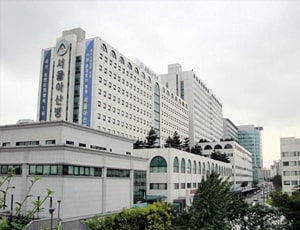
Asan Medical Centre located in Seoul, South Korea is accredited by ISO. Also listed below are some of the most prominent infrastructural details:

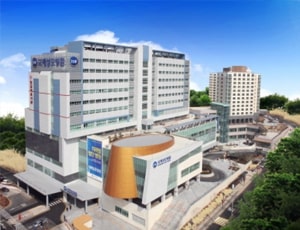
International St. Mary's Hospital located in Seoul, South Korea is accredited by JCI. Also listed below are some of the most prominent infrastructural details:
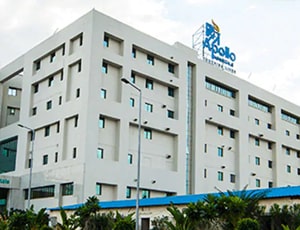
Types of Stomach Cancer Treatment in Apollo Hospital and its associated cost
| Treatment Option | Approximate Cost Range (USD) | Approximate Cost Range (INR) |
|---|---|---|
| Stomach Cancer Treatment (Overall) | 8869 - 13341 | 742914 - 1124430 |
| Surgery | 4957 - 8870 | 409624 - 750552 |
| Chemotherapy | 2225 - 5580 | 186892 - 456594 |
| Radiation Therapy | 1699 - 4547 | 136805 - 370172 |
| Immunotherapy | 3357 - 7795 | 278231 - 637524 |
| Targeted Therapy | 2807 - 8981 | 231866 - 740677 |
| Palliative Care | 1129 - 3924 | 93471 - 318712 |
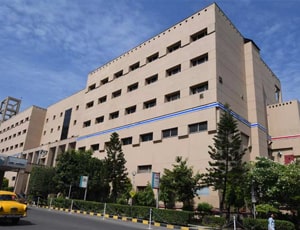
Types of Stomach Cancer Treatment in Apollo Multispecialty Hospitals and its associated cost
| Treatment Option | Approximate Cost Range (USD) | Approximate Cost Range (INR) |
|---|---|---|
| Stomach Cancer Treatment (Overall) | 8922 - 13725 | 752094 - 1085096 |
| Surgery | 5124 - 8981 | 405953 - 737658 |
| Chemotherapy | 2266 - 5733 | 187220 - 469329 |
| Radiation Therapy | 1681 - 4529 | 141264 - 361084 |
| Immunotherapy | 3323 - 7786 | 281301 - 656714 |
| Targeted Therapy | 2872 - 8923 | 231556 - 748298 |
| Palliative Care | 1114 - 4000 | 91280 - 324258 |

Types of Stomach Cancer Treatment in Memorial Atasehir Hospital and its associated cost
| Treatment Option | Approximate Cost Range (USD) | Approximate Cost Range (TRY) |
|---|---|---|
| Stomach Cancer Treatment (Overall) | 4525 - 11163 | 135467 - 345401 |
| Surgery | 3321 - 7721 | 101671 - 232448 |
| Chemotherapy | 2864 - 6600 | 84507 - 203941 |
| Radiation Therapy | 2217 - 5713 | 68445 - 171933 |
| Immunotherapy | 4520 - 9031 | 134109 - 269755 |
| Targeted Therapy | 3904 - 10327 | 120718 - 302030 |
| Palliative Care | 1724 - 4459 | 50634 - 137574 |
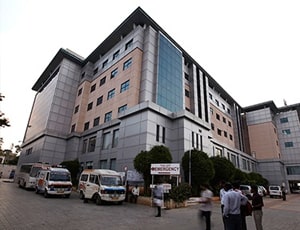
Types of Stomach Cancer Treatment in BGS Gleneagles Global Hospitals and its associated cost
| Treatment Option | Approximate Cost Range (USD) | Approximate Cost Range (INR) |
|---|---|---|
| Stomach Cancer Treatment (Overall) | 9095 - 13260 | 729889 - 1115259 |
| Surgery | 5119 - 9193 | 421314 - 743235 |
| Chemotherapy | 2277 - 5549 | 183356 - 466581 |
| Radiation Therapy | 1688 - 4478 | 140832 - 376807 |
| Immunotherapy | 3308 - 7908 | 278147 - 656484 |
| Targeted Therapy | 2842 - 9079 | 232213 - 729757 |
| Palliative Care | 1102 - 3919 | 94119 - 319020 |
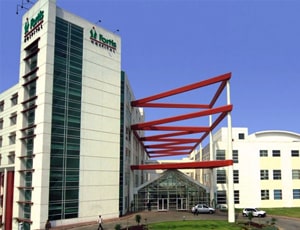
Types of Stomach Cancer Treatment in Fortis Hospital and its associated cost
| Treatment Option | Approximate Cost Range (USD) | Approximate Cost Range (INR) |
|---|---|---|
| Stomach Cancer Treatment (Overall) | 8081 - 12137 | 667262 - 995714 |
| Surgery | 4563 - 8149 | 376337 - 665307 |
| Chemotherapy | 2034 - 5062 | 166958 - 417766 |
| Radiation Therapy | 1526 - 4053 | 124523 - 334368 |
| Immunotherapy | 3035 - 7136 | 249862 - 583051 |
| Targeted Therapy | 2529 - 8103 | 207798 - 668846 |
| Palliative Care | 1013 - 3550 | 82920 - 290835 |
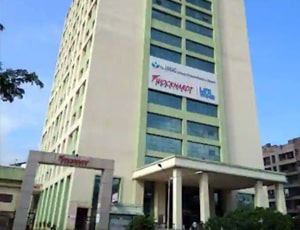
Types of Stomach Cancer Treatment in Wockhardt Hospital, Umrao and its associated cost
| Treatment Option | Approximate Cost Range (USD) | Approximate Cost Range (INR) |
|---|---|---|
| Stomach Cancer Treatment (Overall) | 8148 - 12133 | 664529 - 1003643 |
| Surgery | 4580 - 8083 | 372914 - 663547 |
| Chemotherapy | 2029 - 5068 | 166848 - 417043 |
| Radiation Therapy | 1521 - 4053 | 125293 - 331830 |
| Immunotherapy | 3031 - 7103 | 250738 - 582832 |
| Targeted Therapy | 2544 - 8124 | 208813 - 665954 |
| Palliative Care | 1011 - 3558 | 83462 - 289915 |

Types of Stomach Cancer Treatment in Indraprastha Apollo Hospital and its associated cost
| Treatment Option | Approximate Cost Range (USD) | Approximate Cost Range (INR) |
|---|---|---|
| Stomach Cancer Treatment (Overall) | 8802 - 13393 | 728729 - 1119131 |
| Surgery | 5099 - 9052 | 416274 - 725995 |
| Chemotherapy | 2204 - 5601 | 185890 - 458226 |
| Radiation Therapy | 1680 - 4414 | 138181 - 372538 |
| Immunotherapy | 3432 - 7710 | 272686 - 635300 |
| Targeted Therapy | 2800 - 9083 | 226660 - 740452 |
| Palliative Care | 1111 - 3931 | 92968 - 320555 |
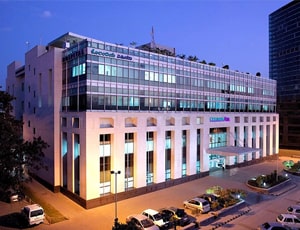
Types of Stomach Cancer Treatment in Manipal Hospital, Yeshwantpur and its associated cost
| Treatment Option | Approximate Cost Range (USD) | Approximate Cost Range (INR) |
|---|---|---|
| Stomach Cancer Treatment (Overall) | 8977 - 13585 | 736820 - 1094942 |
| Surgery | 4986 - 8865 | 423738 - 738378 |
| Chemotherapy | 2237 - 5660 | 186018 - 461053 |
| Radiation Therapy | 1713 - 4582 | 137052 - 365691 |
| Immunotherapy | 3382 - 7724 | 275260 - 632081 |
| Targeted Therapy | 2820 - 9104 | 233162 - 735873 |
| Palliative Care | 1121 - 3858 | 94280 - 324861 |
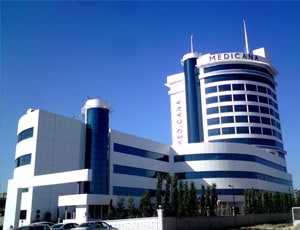
Types of Stomach Cancer Treatment in Medicana Konya Hospital and its associated cost
| Treatment Option | Approximate Cost Range (USD) | Approximate Cost Range (TRY) |
|---|---|---|
| Stomach Cancer Treatment (Overall) | 4416 - 11118 | 137198 - 342923 |
| Surgery | 3406 - 7943 | 102415 - 240418 |
| Chemotherapy | 2779 - 6881 | 84276 - 200039 |
| Radiation Therapy | 2209 - 5564 | 69154 - 168398 |
| Immunotherapy | 4530 - 8991 | 134831 - 266314 |
| Targeted Therapy | 3903 - 10135 | 119825 - 304489 |
| Palliative Care | 1719 - 4428 | 49844 - 136047 |
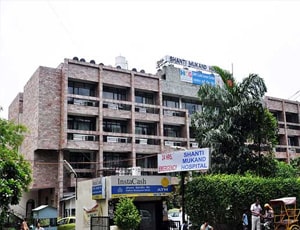
Types of Stomach Cancer Treatment in Shanti Mukand Hospital and its associated cost
| Treatment Option | Approximate Cost Range (USD) | Approximate Cost Range (INR) |
|---|---|---|
| Stomach Cancer Treatment (Overall) | 8089 - 12213 | 669012 - 999373 |
| Surgery | 4575 - 8112 | 375602 - 664708 |
| Chemotherapy | 2030 - 5056 | 165737 - 414478 |
| Radiation Therapy | 1523 - 4054 | 125199 - 333845 |
| Immunotherapy | 3039 - 7123 | 249513 - 580173 |
| Targeted Therapy | 2537 - 8128 | 208321 - 664001 |
| Palliative Care | 1013 - 3539 | 83542 - 291467 |
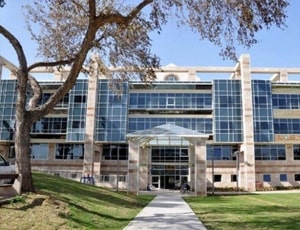
Kaplan Medical Centre located in Rehovot, Israel is accredited by JCI. Also listed below are some of the most prominent infrastructural details:
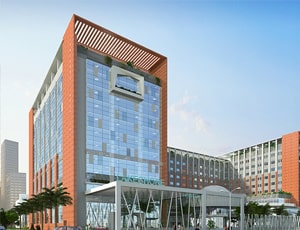
Types of Stomach Cancer Treatment in VPS Lakeshore Hospital and its associated cost
| Treatment Option | Approximate Cost Range (USD) | Approximate Cost Range (INR) |
|---|---|---|
| Stomach Cancer Treatment (Overall) | 8118 - 12228 | 665396 - 998281 |
| Surgery | 4545 - 8096 | 374179 - 663446 |
| Chemotherapy | 2028 - 5083 | 165931 - 416942 |
| Radiation Therapy | 1517 - 4066 | 124828 - 333042 |
| Immunotherapy | 3056 - 7113 | 248620 - 581443 |
| Targeted Therapy | 2537 - 8121 | 208559 - 668660 |
| Palliative Care | 1013 - 3567 | 83353 - 292244 |
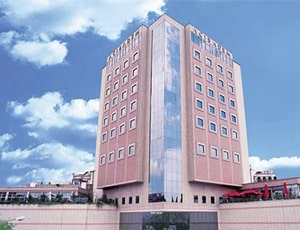
Types of Stomach Cancer Treatment in Acibadem Bakirkoy Hospital and its associated cost
| Treatment Option | Approximate Cost Range (USD) | Approximate Cost Range (TRY) |
|---|---|---|
| Stomach Cancer Treatment (Overall) | 4436 - 11085 | 133252 - 343887 |
| Surgery | 3431 - 7939 | 99942 - 237428 |
| Chemotherapy | 2791 - 6883 | 84312 - 207395 |
| Radiation Therapy | 2271 - 5555 | 68496 - 169503 |
| Immunotherapy | 4452 - 9190 | 133115 - 274278 |
| Targeted Therapy | 3967 - 10028 | 117878 - 299940 |
| Palliative Care | 1696 - 4404 | 51785 - 132720 |
Stomach cancer, also known as gastric cancer, is the fifth most common cancer worldwide. This disease is a result of the growth of cancerous and malignant cells in the inner lining of the stomach.
Stomach cancer does not grow overnight as this disease usually grows slowly over many years. Some pre-cancerous changes take place before true cancer actually develops. But these early changes rarely result in any symptoms and therefore, often go undetected in the early stage when it is most easy to treat it.
Gastric cancer can grow through the wall of the stomach and invade nearby organs. It can easily spread to the lymph vessels and lymph nodes. In an advanced stage, it can travel through the bloodstream and spread or metastasize to organs such as the liver, lungs, and bones. Usually, people diagnosed with stomach cancer have either experienced metastasis already or eventually develop it.
Stomach cancer should not be confused with other cancers in the abdomen or esophageal cancer. Some other cancers can also occur in the abdomen, including cancer of the large and small intestine, liver or pancreas. These cancers may have different symptoms, outlooks, and options for treatment.
Some other types of stomach cancers include squamous and small cell carcinoma and leiomyosarcoma. These cancers are very rare.
There is no single, definite cause behind stomach cancer. However, several stomach cancer risk factors have been identified that could potentially lead to the formation to a tumor in the stomach. Some of these stomach cancer causes or risk factors include:
There can be several early stomach cancer symptoms. However, the signs of stomach cancer could be present because of some other underlying condition as well. Unfortunately, this is the main reason why it is difficult to make a stomach cancer diagnosis at an early stage.
Some of the early stomach cancer symptoms may include:
But just experiencing indigestion or heartburn after a meal does not mean that you have cancer. Although, if you experience these symptoms a lot, talk to your doctor, who can decide whether to conduct further tests or not.
As advanced gastric cancer grow, you may experience more serious signs of stomach cancer, including the following:
There are many options for stomach cancer treatment. Your specialist will choose the most appropriate treatment plan for you, depending on the stage of your cancer.
Most often, a combination of the following stomach cancer treatment options is used to remove tumor:
Stage 0 stomach cancer treatment: It is mostly treated with the help of an endoscopic surgery.
Stage 1 stomach cancer treatment: It is mostly treated with the help of an endoscopic surgery, followed up with a few session of chemotherapy. Sometimes, the surgeon may advise you to undergo a few session of chemotherapy before the surgery as well.
Stage 2 stomach cancer treatment: Surgery is the main treatment option followed by chemotherapy. If you decide against the surgery, a combination of chemotherapy and radiotherapy may be used.
Stage 3 stomach cancer treatment: A few cycles of chemotherapy are conducted before the surgery, followed up with a surgery. Following the surgery, a few cycles of chemotherapy are repeated, followed by radiation therapy.
Stage 4 stomach cancer treatment: Chemotherapy is the main treatment option for such patients. A surgery can be conducted to control the symptoms. Radiotherapy could be used if needed to relieve symptoms.
Recovery after stomach cancer treatment can take a long time. You may need special palliative care to manage the discomforting symptoms such as extreme pain. With constant support from the doctors, friends, nurses and family members, the health eventually feels better and you are able to experience an improved quality of life.
You may not be able to eat properly or by your own immediately after the surgery. However, you are able to return back to your normal routine in a few days. Planning and managing regular chemotherapy visits after the surgery can be difficult.
Discuss with your doctor about specific side effects that you are likely to face after chemotherapy. The doctor will give you specific medications that will help relieve specific symptoms such as nausea, weakness, vomiting, joint pain, and headache.
Ask your healthcare adviser for the best multiple options and choose the one that meets your expectations
The cost of Stomach Cancer Treatment in South Korea starts from $28500. While there are wide range of hospitals offering Stomach Cancer Treatment, international patients should always seek KOIHA-Certified Hospitals in South Korea for the best results.
The Stomach Cancer Treatment package cost in South Korea varies from one hospital to another and may offer different benefits. The top hospitals for Stomach Cancer Treatment in South Korea covers all the expenses related to the pre-surgery investigations of the candidate. The comprehensive Stomach Cancer Treatment package cost includes the cost of investigations, surgery, medicines and consumables. There are many things that may increase the cost of Stomach Cancer Treatment in South Korea, including prolonged hospital stay and complications after the procedure.
There are several best hospitals for Stomach Cancer Treatment in South Korea. Some of the best hospitals for Stomach Cancer Treatment in South Korea include the following:
Upon discharge from the hospital after Stomach Cancer Treatment in South Korea, the patients are advised to stay for about 28 days for recovery. During this time, the patient undergoes medical tests and consultations. this is to ensure that the treatment was successful and the patient us safe to return.
Apart from the Stomach Cancer Treatment cost, there are a few other daily charges that the patient may have to pay. These are the charges for daily meals and accommodation outside the hospital. The per day extra expenses in South Korea per person are about USD 50 per person.
The following are some of the best cities for Stomach Cancer Treatment in South Korea:
The patient has to spend about 5 days in the hospital after Stomach Cancer Treatment for proper recovery and to get clearance for discharge. This phase is important to ensure that the patient is recovering well and is clinically stable. During this time, several tests are performed before the patient is deemed suitable for discharge.
There are more than 2 hospitals that offer Stomach Cancer Treatment in South Korea. These clinics have proper infrastructure for the treatment of patients who require kidney transplant. These hospitals comply with all the rules and regulations as dictated by the regulatory bodies and medical association in South Korea
Some of the top medical specialists for Stomach Cancer Treatment in South Korea are: